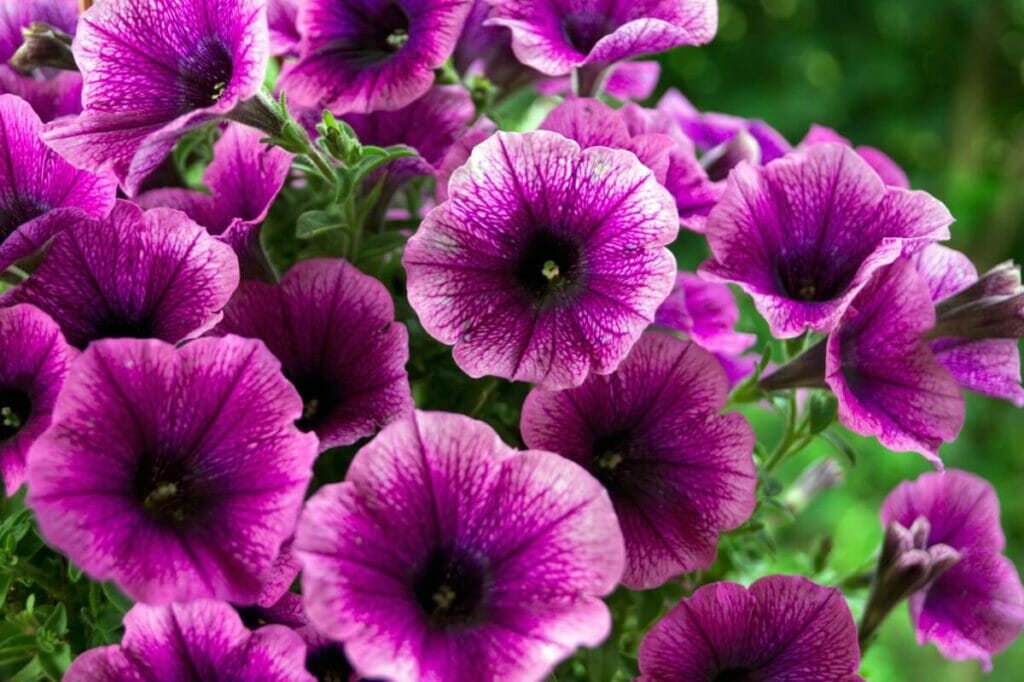Petunia Power: What This Flower Really Says About You
Petunias are a popular annual flower grown in pots and containers across the U.S. According to the 2019 Horticultural Census, petunias rank number one in plant sales nationwide. But petunias haven’t always been esteemed for their beauty. You may be surprised to learn that petunias once symbolized anger and resentment in the language of flowers. Although their popularity in recent years has changed their symbolism, it is still worth noting that some may continue to refer to their outdated meaning. In this guide, we’ll cover everything you need to know about the Petunia flower’s meaning, symbolism, and cultural significance over time.

Etymological Meaning
It is generally believed that the name petunia was derived from the word petun, the term for worthless tobacco plant in the Tupi-Guarani language spoken in South America.
However, some sources report the Tupi-Guarani term for the plant was pety. Still, others like Tom MacCubbin of the Orlando Sentinel claim that a French botanist named Petun collected the first seeds from Argentina in the mid-1800s. The plant was given the name Petunia in his honor.
Pink Petunias

Pink represents gentleness and femininity and is typically equated with motherly love. These petunias make a delightful Mother’s Day gift.
Red Petunias

Red is the color of passion and love. It’s commonly believed that red petunias represent depth and strength in relationships.
White Petunias

White is the color of innocence and purity, but white petunias can also express trust and dignity. They are often displayed at weddings and religious events.
Black Petunias

Black petunias can be interpreted as a sign of death or feelings of gloom, but some say they represent strength and uniqueness. The meaning depends on the relationship between the giver and the recipient.
Yellow Petunias

Bright and cheery yellow petunias represent respect and friendship — Reserve yellow petunias for close friends.
Purple Petunias

Rich shades of purple symbolize fantasy, enchantment, grace, and royalty. Purple petunias also express respect and admiration. Give purple petunias to friends and colleagues.
Blue Petunias

Blue flowers represent trust and peaceful energy and are best for those you trust and admire. Give blue petunias to family, friends, or colleagues.
Petunia Flowers and Folklore
The Mayans and Incas believed that petunias possessed the magical power to chase away spirits and monsters from the underworld. It is said that petunias will not grow in an area with negative energy but will thrive in positive energy.
Petunia Flowers and the Early Spanish Explorers
The first petunias were discovered in Argentina by Spanish explorers in the 16th century. These white flowers were less showy than the dramatic petunias we have today. It is reported that the Tupi-Guarani Indians referred to them as petun, meaning worthless tobacco plants. The explorers were so unimpressed with the plant that they did not bother to gather seeds from it.
Victorian Times
The contradictory symbolism associated with these flowers can be traced back to Victorian times, when the petunia’s association with anger and resentment was linked to the sudden and extreme outbursts by Her Royal Highness Queen Victoria.
Ironically, during Victorian Times, petunias were also often displayed at weddings to symbolize suitable company.
Petunias in Shamanism
The petunia is used in shaman rituals in South America to bring insight. Petunias are thought to enhance creativity and inspiration, make dreams come true, and encourage wonder and hope.
Suitable Gifting Occasions
Today, the meaning and symbolism of petunia flowers make them suitable gifts for housewarmings, birthdays, anniversaries, Mother’s Day, and other celebrations.
The Final Word
For years, petunias symbolized anger and resentment, but that has changed as these beautiful flowers have earned a home in flowerbeds and containers across the USA more popular meaning for petunia flowers is more uplifting as they represent desire, hope, and calmness. Petunias are an ideal gift for housewarmings, Mother’s Day, birthdays, and anniversaries.
Andrew is the Editorial Director at Petal Republic. He holds a BSc degree in Plant Sciences and has trained professionally at leading floristry schools in London and Paris. In amongst overseeing a global editorial team, Andrew's a passionate content creator around all things flowers, floral design, gardening, and houseplants.
